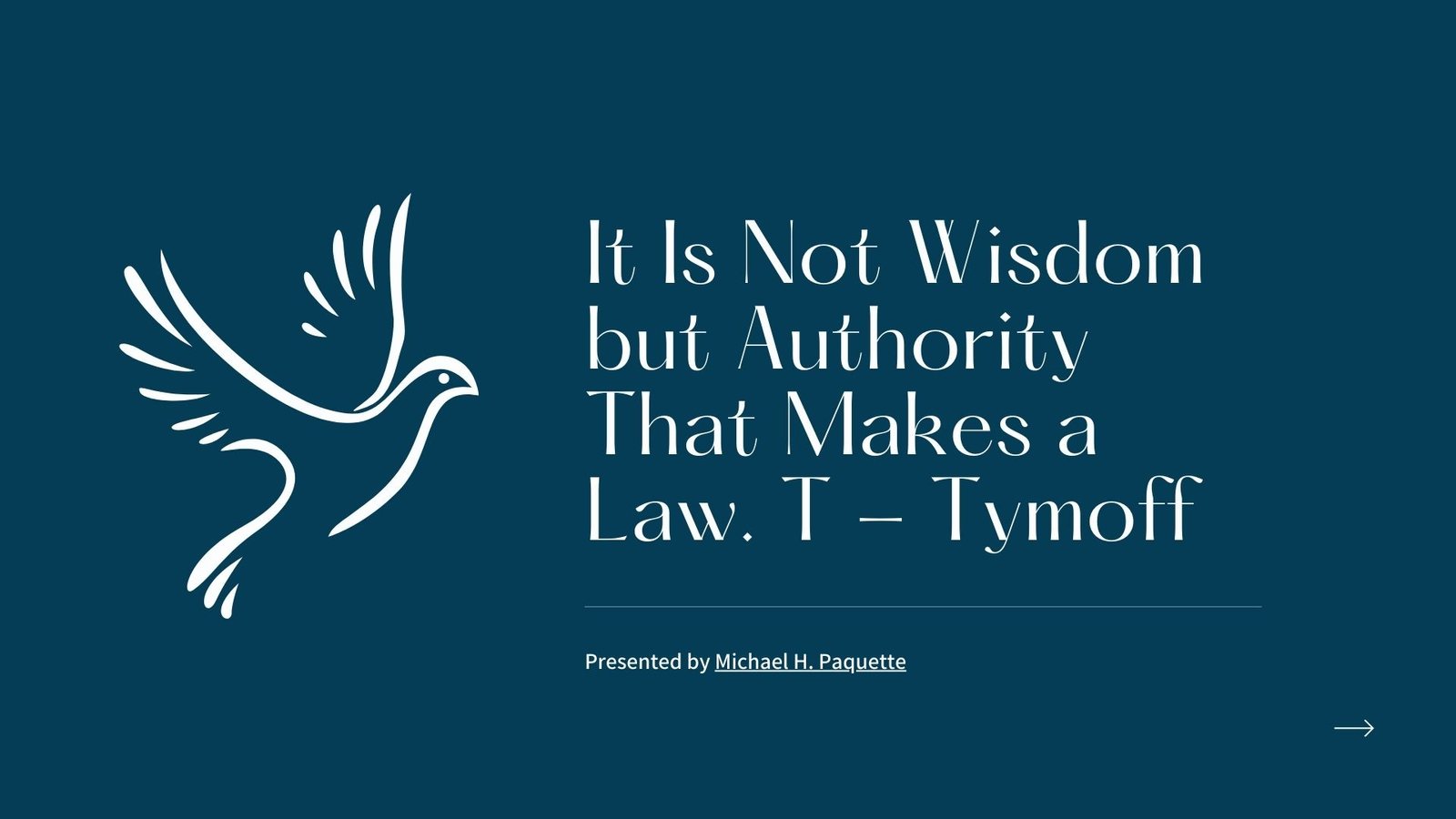It Is Not Wisdom but Authority That Makes a Law. T – Tymoff
Introduction
Laws serve as the backbone of societies, defining permissible and impermissible conduct. They govern individuals, institutions, and nations, ensuring order and stability. However, the question of what truly constitutes a law remains a topic of deep philosophical, legal, and political debate. One perspective encapsulated in the phrase, “It is not wisdom but authority that makes a law. T – Tymoff”, suggests that laws derive their legitimacy from authority rather than wisdom or moral correctness. This assertion challenges the conventional belief that laws should be grounded in reason and ethical principles. Instead, it highlights the role of power, governance, and enforcement in shaping legal structures. This article delves into the historical, legal, and ethical dimensions of this statement, analyzing its implications on modern governance, justice, and societal order.
Also Read: Love What You Have, Before Life Teaches You To Lov – Tymoff
The Nature of Law: Authority vs. Wisdom
The legal system functions as an organized set of rules imposed by governing bodies. The statement implies that laws are created and enforced by those in power rather than being necessarily founded on wisdom or rationality. This notion aligns with legal positivism, a theory suggesting that the validity of a law is determined by its source (authority) rather than its moral or ethical soundness.
Legal systems across the world demonstrate that laws are often dictated by those in power, regardless of their wisdom. Governments, monarchs, and ruling bodies establish laws based on political motives, economic interests, or societal control rather than absolute justice or morality. For instance, historically, oppressive laws such as apartheid in South Africa and segregation laws in the United States were enforced despite their blatant ethical shortcomings. These laws were backed by authority rather than wisdom, underscoring the reality that power, not moral correctness, dictates legal frameworks.
Historical Perspectives on Law and Authority
History provides numerous examples where authority, not wisdom, has been the driving force behind lawmaking. Monarchies, totalitarian regimes, and colonial powers have imposed laws that served their interests rather than those of the general population.
Ancient and Medieval Legal Systems
In ancient civilizations such as Egypt, Mesopotamia, and Rome, laws were often dictated by rulers who wielded absolute power. The Code of Hammurabi (circa 1754 BC), one of the oldest known legal codes, was created by King Hammurabi of Babylon. The laws were based on strict punitive measures rather than philosophical wisdom or fairness. Similarly, in medieval Europe, feudal lords and monarchs dictated laws that ensured their dominance, often at the expense of common citizens.
Colonial and Modern Legal Systems
Colonial rulers imposed legal frameworks that benefited their own administration rather than the indigenous populations. For instance, British colonial rule in India established laws that favored British interests over those of the local people. The Rowlatt Act of 1919 allowed for the arrest of individuals without trial, demonstrating the exercise of authority over wisdom.
Even in modern democratic societies, authority still plays a dominant role in shaping laws. Governments enact policies that cater to political agendas rather than purely ethical considerations. The enforcement of laws, regardless of their wisdom, is a testament to the power structures that dictate societal norms.
The Role of Authority in Law Enforcement
Beyond the creation of laws, authority is critical in their enforcement. Without the backing of state mechanisms such as the police, judiciary, and military, laws would be ineffective. The ability to enforce a law is what makes it functional, regardless of whether it is wise or just.
Power Dynamics in Law Enforcement
The enforcement of laws often reflects political and societal power structures. Laws that serve the ruling elite tend to be enforced more strictly, while those that protect marginalized communities may be neglected. For example, corporate crimes often receive lighter punishments compared to minor offenses committed by lower-income individuals. This demonstrates how authority, rather than wisdom, influences legal application.
Discretion and Interpretation of Law
Judges and law enforcement officers have significant discretion in interpreting and applying laws. This discretion further emphasizes the role of authority, as different interpretations can lead to varied outcomes. Judicial decisions are influenced by legal precedents, political pressure, and institutional biases, reinforcing the idea that authority ultimately dictates legal outcomes.
The Ethical Dilemma: Should Laws Be Based on Wisdom?
While the statement suggests that laws derive their power from authority rather than wisdom, it raises an ethical dilemma: should laws be based on wisdom? In an ideal society, laws should reflect ethical principles, justice, and fairness. However, history has shown that this is not always the case.
The Case for Wisdom-Based Laws
Laws rooted in wisdom can foster justice, equality, and human rights. Philosophers such as John Locke and Jean-Jacques Rousseau advocated for laws based on social contracts and natural rights, emphasizing fairness and ethical governance. The Universal Declaration of Human Rights (UDHR) is an example of wisdom-based legal principles that aim to protect human dignity and freedom.
The Reality of Power-Driven Laws
Despite the moral appeal of wisdom-based laws, the reality is that authority continues to dominate legal systems. Governments prioritize stability and control, sometimes at the cost of justice. Policies on surveillance, censorship, and national security often infringe upon individual rights, showcasing how authority supersedes wisdom in lawmaking.
Also Read: I Fear No One, But Respect Everyone. – Tymoff
The Balance Between Authority and Wisdom in Modern Legal Systems
Modern democracies attempt to balance authority and wisdom through legal frameworks that incorporate checks and balances. Constitutions, independent judiciaries, and human rights organizations serve as mechanisms to prevent the abuse of power.
Role of Democratic Institutions
Democracies aim to integrate wisdom into legal systems through representation, public debate, and judicial oversight. However, political agendas and lobbying influence legislation, often prioritizing authority over ethical considerations. For example, drug laws vary significantly across nations, with some countries prioritizing rehabilitation while others emphasize punitive measures.
The Challenge of Implementing Wise Laws
Implementing laws based on wisdom requires overcoming political resistance, economic interests, and societal biases. For instance, climate change regulations face opposition from industries and political groups, highlighting how authority can override wisdom in policymaking.
Conclusion: The Reality of Lawmaking
The assertion, “It is not wisdom but authority that makes a law. T – Tymoff”, encapsulates the fundamental nature of legal systems throughout history. While wisdom should ideally guide lawmaking, authority remains the ultimate determinant of what constitutes a law. Power structures, political interests, and enforcement mechanisms play a crucial role in shaping legal frameworks, often at the expense of justice and moral reasoning.
Despite the dominance of authority, societies must strive for a balance where laws reflect both power and ethical wisdom. Strengthening democratic institutions, advocating for human rights, and promoting legal reforms can bridge the gap between authority-driven laws and justice-oriented governance. Ultimately, while authority may make the law, wisdom should guide its evolution to ensure fairness, equity, and societal well-being.









Post Comment